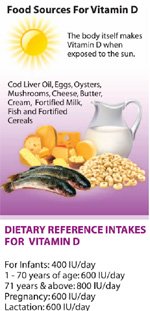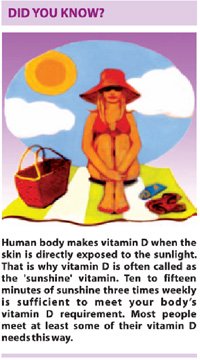Do you get exhausted easily? Do you get palpitations very often? Do your muscles feel sore and weak? Well, then there is a great likelihood that you could be a victim of Vitamin D deficiency.
Vitamin D (calciferol) belongs to a group of fat soluble secosteroids. In humans, vitamin D is unique because of its functions as a prohormone as well as its synthesis to vitamin D3 in the body when exposed to adequate sunlight.
Vitamin D regulates the concentration of calcium and phosphate in the body and promotes healthy growth and remodelling of the bone. Vitamin D prevents rickets in children and osteomalacia in adults. Along with calcium, it protects elder adults from osteoporosis.
Vitamin D also affects neuromuscular functions, causes inflammation and influences the action of many genes that regulate proliferation and apoptosis of the cells. Vitamin D is also essential for the healthy growth of hair follicle as well as for a healthy immune system. Vitamin D deficiency is the main cause of rickets in young infants because breast milk is low in vitamin D and so is the cereal based diet.
Vitamin D & Bones

Vitamin D deficiency is known to cause several bone diseases like:
- Rickets, a childhood disease characterised by impeded growth and deformity of the long bones. The earliest sign of subclinical vitamin D deficiency is abnormal softening or thinning of the skull
- Osteomalacia, a bone-thinning disorder that occurs exclusively in adults, and is characterised by proximal muscle weakness and bone fragility
- Osteoporosis, a condition characterised by reduced bone mineral density and increased bone fragility
People At Risk
- Naturally dark skinned people
- Elderly & people who are housebound
- People who cover their skin for religious or cultural reasons
- Babies & infants of vitamin D deficient mothers, especially breast fed babies
Signs & Symptoms
- Poor growth in children
- Delayed tooth formation
- Dental deformities
- Tingling
- Weakness
- Muscle cramps
- Bone pain
- Spine and other bone deformities
- Stooped posture and loss of height
Managing Vitamin D Deficiency
25 hydroxyvitamin D level of 20 ng/ml (nanogram/mililitre) in serum is desirable for bone and overall health. Vitamin D intake lower than 100 International Unit (IU)/day is associated with increased risk of hip fracture.
Oral vitamin D replacement or intramuscular injections are prescribed to treat Vitamin D deficiency.
Vitamin D Facts

- Without sufficient vitamin D, which is crucial for calcium absorption in your intestines, your body cannot absorb calcium, thus rendering calcium supplements useless
- Sunscreens, even the ones like SPF-8 block your body’s ability to generate vitamin D by 95%. Therefore, sunscreen products can create critical vitamin deficiency in the body
- Natural sunlight rays responsible for generating vitamin D in your skin cannot penetrate glass. Therefore, your body can not generate vitamin D from the sunlight you receive while sitting in your car or home
Research Highlights
Research shows that dark skinned people living in the temperate climate have low Vitamin D levels as melanin in the skin hinders vitamin D synthesis.
Tags: health tips, Vitamin D


